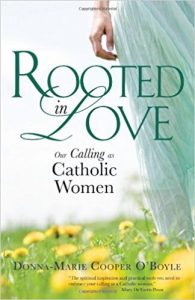Rooted in Love: Our Calling as Catholic Women
by Donna-Marie Cooper O’Boyle
 “Rooted in Love” has a very appealing cover. It gives a partial view of a woman walking through a field of what appear to be dandelions or buttercups. The layout, typesetting and soft, bright colors are pleasing. Even more pleasing is the connection between the feminine and the earth, and the representation of natural beauty. This book comes in an attractive “package.”
“Rooted in Love” has a very appealing cover. It gives a partial view of a woman walking through a field of what appear to be dandelions or buttercups. The layout, typesetting and soft, bright colors are pleasing. Even more pleasing is the connection between the feminine and the earth, and the representation of natural beauty. This book comes in an attractive “package.”
Can you judge a book a book by its cover? There are some parts I like in this book, other aspects that I don’t identify with. I am not fully comfortable with Donna-Marie Cooper O’Boyle’s evangelical style.
Nevertheless, I find enough good in the book to write about it. I was reading a chapter a day but did not get farther than three paragraphs on Day 5 before pausing to meditate. “How is Christ ‘my life’ at home?” the author asks.
As a professional family life minister, I know a lot about Christ in the home. But that day I needed to reflect on Christ being not just “in” my life but “being” my life at home. Once again I had to be present to Christ who reveals himself in the quotidian of the household.
The very next paragraph deserves highlighting. Cooper O’Boyle says, “For me, the greatest joy in my vocation is the awareness that I have been raising my five children in the faith all these years — thirty-five to be exact. I consider my home to be a ‘domestic church,’ a little church where amazing growth and transformation happen right within the nitty-gritty details of daily life.”
Her thinking is affirmed by “On the Family” (“Familiaris Consortio”), an apostolic exhortation Pope John Paul II wrote early in his pontificate, and by “Follow the Way of Love,” a 1993 pastoral statement written in ordinary language by the U.S. Catholic bishops.
Cooper O’Boyle encourages all women to read “On the Dignity and Vocation of Women” (“Mulieris Dignitatem”), a 1988 apostolic letter of John Paul II. She says it will lift our spirits, which often may be needed, given the trials and tribulations women face. A few pages earlier she had related her personal humiliation while being investigated for child abuse; apparently someone reported that suspicion after noticing that one of her more rambunctious children had a black eye after tripping over a table leg. She also experienced abandonment by her husband and lived in poverty as a single mother for awhile. One of several miscarriages nearly took her life.
Those are ordeals many of us do not have to undergo, but all mothers have to deal with the daily demands of parenthood. We sacrifice comfort while seeing to the needs of young ones and even put our personal desires on hold for our children’s sake.
Cooper O’Boyle illustrates another kind of suffering that she did not experience, though some women do: the expectation by a husband that his wife should be submissive to him. In “Mulieris Dignitatem” John Paul II explains the real meaning of the passage in Paul’s Letter to the Ephesians that some people mistakenly use as “proof” that a husband should rule over his wife.
Blessed John Paul II says that this text “is to be understood and carried out in a new way: as a ‘mutual subjection out of reverence for Christ’ (cf. Eph 5:21). This is especially true because the husband is called the ‘head’ of the wife ‘as’ Christ is the head of the church; he is so in order to give ‘himself up for her’ (Eph 5:25), and giving himself up for her means giving up even his own life. … (T)he ‘subjection’ is not one-sided but mutual.”
Reminding readers that women care for the people with whom God surrounds them, the author encourages every reader to be a woman for others. She starts with the reality of keeping in touch with extended family. Distance can make that challenging, a fact I well know. My large family of origin is spread across a geographical polygon that is more than 1,200 miles along several sides.
With aunts and uncles, cousins, nieces and nephews, plus my husband’s extended family and now our children’s families, our extended family stretches throughout most of the United States and sometimes to other countries. Electronic media make it easier for us to connect, but do not increase intimacy. That still requires face time and presence at important events, which demand a lot of time and energy.
Virtue in being a woman for others balances responsibility for self with responsibility for those God gives us. That does not come out as clearly in the book as I wish it did.
Cooper O’Boyle is obviously a very enthusiastic Catholic woman. She freely shares her energy, talents and piety, and she sees fruits from what she does. She also receives a lot of affirmation in response to her books, EWTN show and speaking engagements. Although Cooper O’Boyle’s style is not like my own, she appeals to many people.
About the reviewer
Mary Ann Paulukonis has been called to love as a wife, mother and grandmother. She also enjoys writing, artistic pursuits and consulting for leadership and ministry.
Disclaimer: Book reviews do not imply and are not to be used as official endorsement by the USCCB of the work or those associated with the work. Book reviews are solely intended as a resource regarding publications that might be of interest to For Your Marriage visitors.




